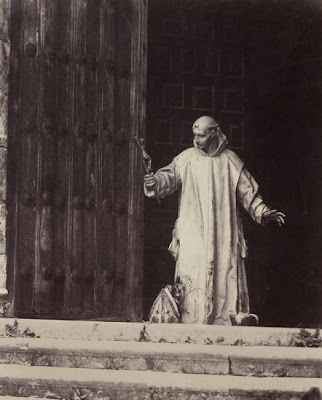 Why does God, Who is Love, keep us waiting? Because He is Love, and seeks love. Love that does not know how to wait is not love. To love is to give oneself. Not only for a fraction of a lifetime, nor with a part of its strength: love is, and seeks, the total gift of self.
Why does God, Who is Love, keep us waiting? Because He is Love, and seeks love. Love that does not know how to wait is not love. To love is to give oneself. Not only for a fraction of a lifetime, nor with a part of its strength: love is, and seeks, the total gift of self.Love is based on esteem. We only love what we value and admire. We love only the 'good'. What is too easily and too quickly come by does not attract deep souls. It becomes a superficial good, which cannot satisfy the rich capacity of their nature. And they are right! The relations between beings are governed by laws, which they guess at but cannot always define. It is a law that real treasures are deeply buried and carefully hidden; that serious acquisitions call for proportionate efforts. What exceptions there are do not weaken the argument.
God is the treasure beyond price. Were He to give Himself too easily, even the best would turn their backs upon Him. Saint John Climacus gives an almost similar reason, but with an interesting difference. 'Prayer', he says, 'is an activity which develops and enriches enormously. It is a source of merit and satisfaction, and of spiritual progress of every kind'. God imposes repetitions and a certain persistence in prayer in order to increase our merit. Delays in union are not time lost: far from it. God sees very far ahead; He makes wonderful use of what we call evil -- of our wanderings, our hesitations and detours, although He does not love them or want them. It is at these moments, above all, that we need confidence and perseverence. The prayer, whether for ourselves or for others, which is not discouraged, which persists and besieges heaven, touches God's Heart: and that is why He tells us to persevere.
God is love. He loves, and wants to be loved; it is the basic law of His being. To realize this is to find the solution to all our problems.
A soul that tends towards Him cannot tire Him. It always delights Him and the soul should know this. Its persistency displeases Him only when it is for something it wants inordinately. For example, I want good health, and I insist. Such a request could displease Him, because I must want -- at all costs, that is -- only what He wills; and health is not in His Eyes essential. He is saddened, not by my persistence, but because an irregular wish such as this separates me from Him.
When it is a question of the real good, of such things as He always wills and for which we can ask Him without being separated from Him, our persistence pleases Him. It is what our Lord Himself commended in two or three delightful parables -- the child asking his father for bread; the friend knocking repeatedly at his friend's door for the same reason; the widow who persevered in asking a judge, and a wicked one at that, for justice, until she obtained it.
God is a Father, a Friend and a Judge. But He is a Father Whose love is boundless, and Whose power is as great as His love. He is a Friend, Whose friendship knows no change, and is at the mercy of all our needs. He is a Judge, but always just, always moved by our appeals and quick to answer them. He loves our persistence, He wants us to appeal to Him, to ask of Him, so that He can be sure of our love, and taste the joy of having a proof of it, even if it be a selfish one.
~ Dom Augustin Guillerand ~











